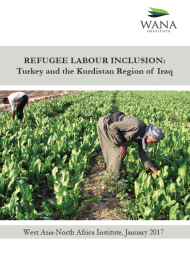-
Refugee Labour Inclusion: Turkey and the Kurdistan Region ...
Refugee Labour Inclusion: Turkey and the Kurdistan Region of Iraq
The following report is an assessment of the viability and the modalities of including Syrian refugees in the labour markets of the following host states: the Kurdistan Region of Iraq, and Turkey. Due to a lack of data available on refugee skillsets, the ability to quantify absorption capacity by sector was limited. As a result, this analysis is heavily based on qualitative research.
Findings from the Kurdistan Region of Iraq implied difficulty in integration of Syrian refugees due to a series of economic shocks, including the limitation of payments from the central government, Da’esh control, and high number of IDPs. In spite of employment programmes for refugees, including subsidised wages and cash-for-work, long term employment has not been a successful venture due to overall economic struggle and lack of incentive to hire them. There may be potential for turnaround following reduced Da’esh presence in the region.
Turkey’s economy has a higher potential for integration due to its much larger scope and more highly sophisticated economic development. Agriculture is an important contributor to the Turkish economy, as Turkey is one of a few countries almost entirely food sufficient. Considering that Syrian refugees have exhibited skills in agriculture, it is likely that there is an alignment between refugee skill and Turkish economic demand. Other sectors of possible increased inclusion include infrastructure and services, both of which have high informal refugee presence.

